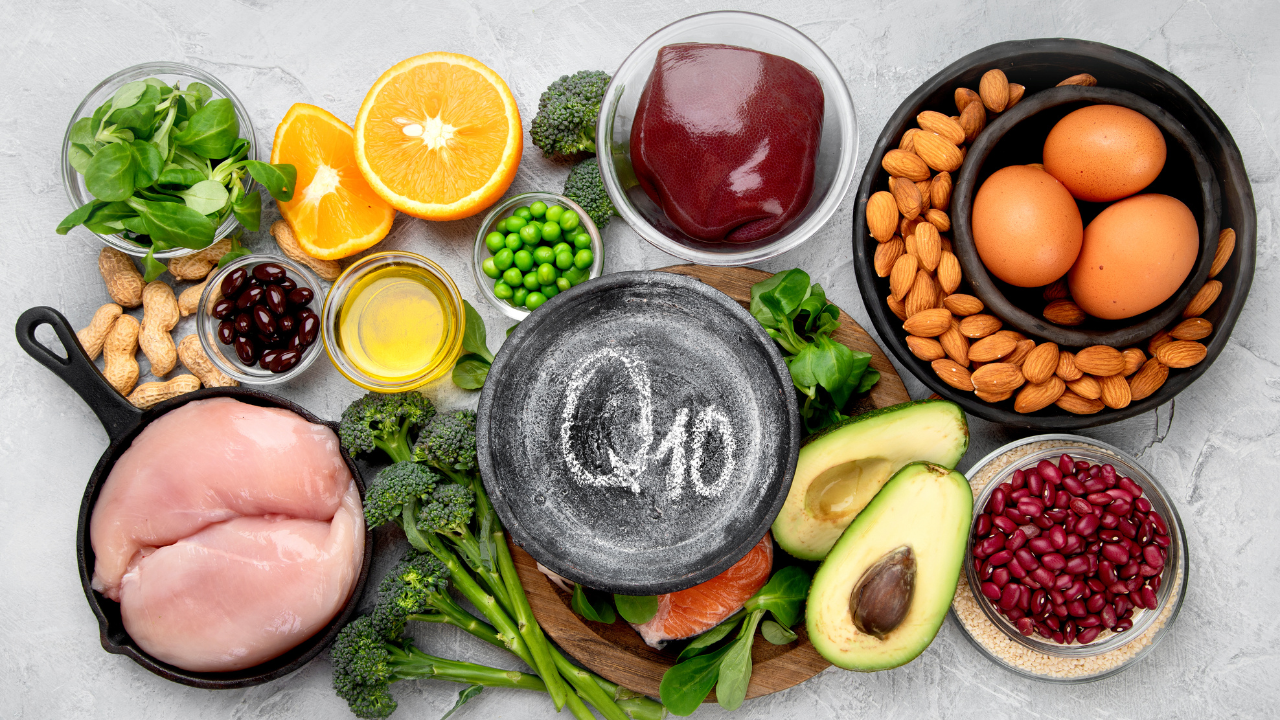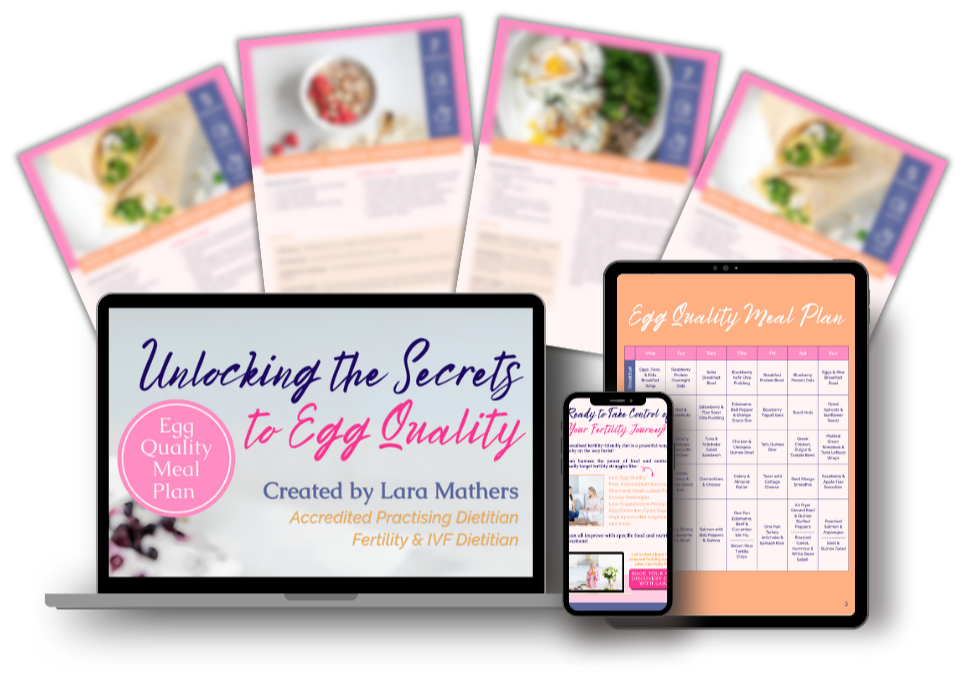How CoQ10 Can Boost Fertility: Benefits, Uses, and Expert Tips

In recent years, CoQ10 has been extensively studied in the women's health and fertility area for it's benefits on mitochondrial function. It has gained attention for its potential benefits in reproductive
health. But what exactly is CoQ10, and how can it support fertility?
What is CoQ10?
Coenzyme Q10, also called Ubiquinol, Ubiquinone and Ubidecarenone, is a very special nutrient which we find in our food supply - think fatty fish 🍣, red meat 🥩, organ meats and poultry 🦃! The amounts we find in food are very small compared to the doses we can supplement with.
It is a naturally occurring antioxidant in the body that plays a key role in cellular energy production and protecting cells from oxidative stress (damage). However, as we age, our levels of CoQ10 decrease, which can impact the quality of eggs and sperm. This is really important for DNA repair and production 🧬.

The Benefits of CoQ10 for Reproductive Health
The research on CoQ10 and fertility outcomes indicates multiple benefits. Here is a list of a few ways it can help you!
1. CoQ10 improves egg quality by enhancing mitochondrial function, which is crucial for healthy egg development. This is particularly helpful for women over 35 years old, when age may start to
impact egg health (Advances in Nutrition, 2024).
2. CoQ10 and sperm health. A 2023 study published in Andrologia using CoQ10 supplementation for male factor infertility, demonstrated improvement in three separate sperm parameters. These were motility (movement), concentration (numbers) and morphology (shape and look of sperm). Making CoQ10 a beneficial supplement for male factor infertility (Clinical & Experimental Reproductive Medicine, 2024) .
3. CoQ10 supplementation for IVF success. By reducing oxidative stress, CoQ10 helps protect reproductive cells, improving overall fertility outcomes. This can lead to a higher number of retrieved oocytes, better embryo quality, higher pregnancy and live birth rates during IVF treatments (Advances in Nutrition, 2024).
4. Team Player: Studies in 2023 showed that combining CoQ10 with Vitamin E and Omega-3s had a synergistic effect and packed an even bigger punch!
Who Can Benefit from CoQ10?
Certain groups may find CoQ10 supplementation particularly beneficial:
- Women over 35 years old
- Individuals with low ovarian reserve / diminished ovarian reserve (DOR)
- Couples undergoing IVF
- Men with sub-fertility or infertility issues
- Thyroid conditions like Graves Disease
- Individuals on statins, which can lower CoQ10 levels
What is the best CoQ10 supplement for fertility?
Whilst there are various types of CoQ10 formulations, each differing in terms of bioavailability, absorption, and additional ingredients. Here are some common types of CoQ10 formulations and their
differences:
Ubiquinone vs. Ubiquinol:
- Ubiquinone or Ubidecarenone: This is the oxidised form of CoQ10 and is the most common supplement form. It is immediately converted by the body into ubiquinol to be utilised.
- Ubiquinol: This is the reduced, active antioxidant form of CoQ10. It is purportedly more
bioavailable, meaning it is absorbed more efficiently by the body. However, recent evidence
has shown that the body immediately converts ubiquinol to ubiquinone upon consumption!
We now know that both Ubiquinone and Ubiquinol are in a constant flux in the body, transitioning between each molecular structure all the time! So, newer research suggests it isn’t necessary to fork out the big buck for Ubiquinol (unless you want to!).
Soft gel Capsules or Bio-enhanced formulations:
- Many CoQ10 supplements come in soft gel form, which often contain oils that enhance absorption (e.g., fish oil or olive oil). This formulation may provide better bioavailability due to the fat content.
- Some newer formulations use unique technologies to improve absorption and bioavailability further, these are usually more expensive brands.
Combination CoQ10 products, i.e. with additional ingredients:
- Some CoQ10 products are combined with other nutrients which provide a synergistic and boosting effect! These combinations can include omega-3 fatty acids, vitamin E, vitamin C or other antioxidants (Salvio et al, 2021).
What CoQ10 can I take if I am Vegetarian or Vegan?
- While most CoQ10 supplements are derived from fermentation processes or animal sources, there are vegetarian and vegan options available that are typically derived from yeast.
Want to take the guesswork out of finding the best supplements for you?
Book in for an Express Prenatal Consult (button)
What is the best dosage for fertility?
Dose matters!
While optimal dosages of CoQ10 for fertility can vary, many studies have used 100-600 mg daily.
And, how long should you take CoQ10 for fertility? While individual responses vary, it typically takes at least 3 months of consistent supplementation to see improvements in egg or sperm quality. This aligns with the natural cycle of egg and sperm development.
So, for best results, whether you are trying to conceive naturally or going through IVF, starting CoQ10 a minimum of 3 months beforehand is recommended.
It's generally recommended to split the dose as absorption of CoQ10 maxes out at roughly 200mg per dose. So, depending on your overall daily dose, you might want to take half in the morning and half in the evening is for better absorption.
As your medical history will determine the correct dose for you ⭐️ it is always best to consult with a certified prenatal dietitian for an individualised supplement plan for you, and your partner! It takes two to make a baby!
How to Incorporate CoQ10
If you or someone you know might benefit from CoQ10, consider discussing supplementation with a healthcare provider. They can provide guidance tailored to individual health needs and fertility goals.
By understanding and utilising supplements like CoQ10, many can take proactive steps towards enhancing their reproductive health.
Share this information with anyone who might find it helpful!
Potential Side Effects:
CoQ10 is generally well-tolerated, but some individuals may experience very mild side effects such as nausea, headache, or insomnia. These effects are usually minimised by taking CoQ10 with food. If any side effects persist or become bothersome, it is advised to consult with a healthcare provider to adjust the dosage or explore alternative options.
Interactions with Medications
Before beginning CoQ10 supplementation, it's important to discuss with your healthcare provider, especially if you are taking medications. CoQ10 may interact with certain medications, such as blood thinners like warfarin, potentially affecting their efficacy. A healthcare provider can help assess any potential interactions and ensure safe supplementation.
Conclusion
CoQ10 presents promising benefits for those looking to enhance fertility and reproductive health. By improving egg and sperm quality, supporting mitochondrial function, and reducing oxidative stress, CoQ10 can be a valuable addition to your fertility journey. However, as with any supplement, it is essential to consult with a healthcare professional to determine the appropriate dosage and ensure it aligns with your individual health needs.
For personalised advice and to take the guesswork out of supplementation, book an Express Prenatal Consult with me! I tailor your supplement plan to your unique needs.
If you found this information helpful, consider sharing it with others who might benefit from understanding the advantages of CoQ10. Knowledge is empowering, and sharing it can help others take informed steps toward achieving their fertility goals!




